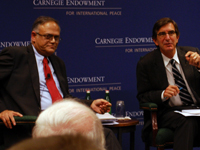Registration
You will receive an email confirming your registration.
IMGXYZ3278IMGZYXFor the past 60 years, the majority of U.S. perceptions about Pakistan have been inaccurate. To a lesser extent, the same applies to Pakistani perceptions of the United States. Former senator and federal minister of Pakistan Javed Jabbar discussed why it is vitally necessary to explore how fact and fiction influence the complexities of Pakistan’s relationship with the United States. Carnegie’s George Perkovich moderated.
Fundamental Dissimilarities
Jabbar noted that fundamental dissimilarities between the U.S. and Pakistan have complicated their relations over time:
- Age: Although the United States is a relatively young country, it is still almost two hundred years older than the Pakistani state.
- Territory: Jabbar observed that the United States’ territory is continental, and far exceeds the size of Pakistan. The United States’ territory has grown over the last century, as has India’s. Pakistan, on the other hand, has shrunk drastically due to the loss of the former east wing of Pakistan, present-day Bangladesh.
- System of Government: Jabbar argued that there is a secular/religious divide between the United States’ and Pakistan’s systems of governance. In the United States, democracy has always held sway, whereas in Pakistan, there has been a rotation between civil and military autocrats.
- Political Elite: In the United States, the political elite is primarily made up of Caucasian Christians, whereas in Pakistan, the elite are Punjabis.
- Economic Importance: Pakistan constitutes a small fraction of the United States’ total trade, but the importance of the American economy to Pakistan is staggering, Jabbar said.
- Aid Relationship: The United States gives aid to Pakistan, while the reverse has never been true. This imbalance is compounded by the inconsistency of American aid, Jabbar added.
Known Myths and Unknown Truths
Jabbar laid out four common myths about the U.S.-Pakistan relationship:
- Myth #1 – Pakistanis Hate Americans: Conventional wisdom suggests that anti-Americanism is rife in Pakistan, Jabbar said. Debate remains as to whether this sentiment was built up gradually or only crystalized after 9/11. In fact, Pakistanis differentiate the U.S. government from America as a whole, and reserve criticism for controversial U.S. government policies in the Muslim world and on Pakistani territory. Pakistanis are avid consumers of American products and popular culture, Jabbar explained.
- Myth #2 – The Pakistan Army Rules the Roost: Another prevalent myth is that the Pakistani Army calls the shots on all vital issues, and that Inter-Services Intelligence (ISI) – Pakistan’s state intelligence agency – in turn rules the Army. Jabbar argued that this is a half-myth, half-truth: the Army does play a crucial role in Pakistan, a fact which will not change until peace is made with India. However, Jabbar noted that whenever the civil process produces a competent and strong leader, then the Army falls in line.
- Myth #3 – The Pakistan Army is Playing a Dual Game in Afghanistan: According to this popular myth, the Army is backing certain insurgents in Afghanistan while outwardly pledging its support for stability in the country. Jabbar argued that Pakistan must deal with Afghanistan and many of these groups based on historical, geographic, and ethnic ties. This historical context leads to more complicated relations with the insurgent groups. He also noted that the Haqqani network – one of the most prominent insurgent groups – is acting in a way that they perceive as patriotic. Moreover, migration across borders and within states is difficult to control. Finally, he pointed out that many Pakistanis have died in the war on terror, which begged the question of why Pakistan would support the terrorists that killed their fellow countrymen.
- Myth #4 – Pakistan Wants India Out of Afghanistan: Jabbar said that it is true that Pakistan would prefer an Afghanistan free of Indian influence, but Pakistan also wants a stable Afghanistan, and conceded that India has an important role to play in this regard. Thus, Afghanistan can be friendly to India, but not at the cost of threatening Pakistan.
Challenges for the Relationship
Jabbar noted several challenges that still plague the U.S.-Pakistan relationship:
- Differences in Power: The difference in power between the two countries is vast, and that makes relations difficult.
- Gap Between Perception and Reality: There is a wide gulf between American and Pakistani perceptions and the reality on the ground. Jabbar argued that bridging this gap is a tremendous challenge, particularly in light of the need to maintain a fair and free media while still curtailing its prejudices and alarmist tendencies. Jabbar added that the recent visit by Secretary of State Clinton and a senior-level delegation in Pakistan was an important step toward this goal, and may have dispelled much of the incoherence that Pakistanis perceived in American policy.
Jabbar concluded with a call for the United States to stop its verbal warfare against Pakistan, arguing that the constant assault on Pakistan’s credibility and sincerity is damaging to the relationship. Grievances should, instead, be brought up privately.
